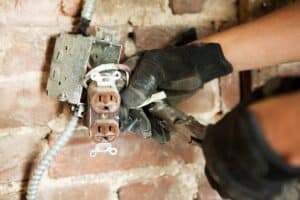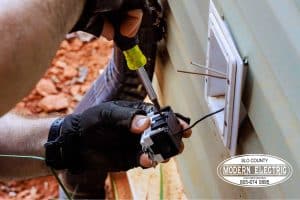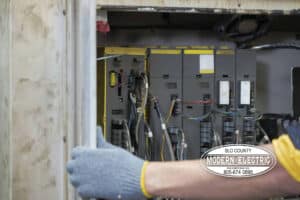Rewiring a house is a big investment that’s safer, more energy efficient and meets modern electrical standards. For homeowners in California, especially in San Luis Obispo, understanding the costs and process is key. This guide goes into the factors that affect rewiring costs and provides insights specific to California homes.
What is Home Rewiring
Home rewiring is replacing old or unsafe electrical wiring (also known as house wiring) to meet current safety codes and modern electrical demands. This includes installing new wires, outlets, switches and circuit breakers. Upgrading to Romex wiring, a type of non-metallic sheathed cable, is common because it’s safer and easier to install. NM cable is used in house wiring projects for both new construction and remodeling.
Electrical wiring should always be done by licensed electricians or reputable electrical contractors to ensure safety and code compliance.
Average Cost to Rewire a House
The cost to rewire a house varies based on several factors including home size, age and accessibility of wiring. Here are the average costs to help homeowners budget and compare services:
- National Average: $7,000 (homeowners pay this on average but house costs can vary widely)
- Typical Range: $3,000 – $15,000 (homeowners pay within this range depending on their needs)
- Cost per Square Foot: $5 – $17
For example, rewiring a 2,000 sq ft home can cost between $10,000 and $34,000 depending on the complexity of the project and local labor rates. Project costs and the project’s cost are affected by home size, wiring complexity and local labor rates.
Cost Per Square Foot: A Breakdown
Factors That Affect Rewiring Costs
Rewiring a home is a big investment and several key factors can impact the total cost. Common cost factors include the size and age of the home, the type of existing wiring and the scope of the project. Understanding these elements will help homeowners budget better and make informed decisions.
1. Home Size and Layout
The size of your home is one of the biggest determinants of rewiring costs. Larger homes require more wiring, outlets and labor so costs are higher. For example, rewiring a 2,500 sq ft home in California can cost between $15,000 and $25,000 depending on many factors. The cost to rewire the entire house depends not only on square footage but also on the complexity of the home’s layout.
Also, the layout of your home plays a role. Homes with complex designs, multiple stories or hard to reach areas may require more labor intensive work so costs are higher.
2. Age and Condition of Existing Wiring
Older homes, especially those built before the 1970s, often have outdated wiring systems like knob-and-tube or aluminum wiring. Older wiring like tube wiring and knob and tube wiring is common in an old house and presents unique challenges due to its age, safety concerns and differences from modern standards. These systems are not only inefficient but can also be safety hazards. Replacing such wiring is more labor intensive and may require additional upgrades to meet current electrical codes so costs are higher.
In San Luis Obispo, many historic homes fall into this category so careful planning and execution is required during rewiring projects. Old houses with older wiring including knob and tube wiring may require more extensive upgrades to ensure safety and compliance.
3. Accessibility of Wiring
The ease of access to existing wiring impacts labor costs. Homes with wiring hidden behind plaster walls, in crawl spaces or attics present challenges that require more time and effort to navigate. Having access wires in place can greatly reduce the need to open walls which helps minimize both labor and repair costs. In some cases walls may need to be opened so additional costs for drywall repair and painting.
4. Electrical Panel Upgrades
Rewiring often requires upgrading the electrical panel to handle increased loads from modern appliances and electronics. The service panel is a critical component of the home’s electrical system, distributing power throughout the house. Upgrading service panels may be necessary to meet modern demands and ensure safety. Upgrading to a 200-amp panel can add $1,500 to $3,000 to the project.
5. Material Choices
The type of materials used affects the total cost. Copper wiring is more expensive than aluminum but preferred for its durability and conductivity. Choosing new electrical wiring materials can also impact both cost and safety as modern options may offer better performance and compliance with current standards. Also choosing high quality outlets, switches and fixtures can increase material costs but offer better longevity and safety.
6. Permits and Inspections
California has strict building codes and permits are required. Make sure to get the proper permits including electrical permits to comply with local codes and ensure the safety of your wiring project. Permit fees range from $200 to $1,000 depending on the scope of the project. After installation an electrical inspection is required to verify the work meets local codes and safety standards; electrical inspections cost several hundred dollars depending on the scope of the project.
7. Local Labor Rates
Labor costs vary in California. Urban areas with a higher cost of living like San Luis Obispo may have higher electrician rates than rural areas. Electricians charge between $50 and $150 per hour so that impacts the total project cost. Hiring a professional electrician ensures the work is done safely and meets all quality standards.
8. Additional Upgrades and Customizations
Smart home technologies, additional outlets or specialized lighting can add to the cost. While these upgrades are convenient and functional they require more materials and labor. These types of upgrades are often included in a larger home improvement or electrical project especially when rewiring or upgrading electrical systems in older homes.
Cost Breakdown by House Size
|
House Size (sq ft) |
Estimated Cost Range |
| 1,000 | $5,000 – $17,000 |
| 1,500 | $7,500 – $25,500 |
| 2,000 | $10,000 – $34,000 |
| 2,500 | $12,500 – $42,500 |
These estimates include labor, materials, permits and inspections. Homes may have different costs due to local labor rates and permit requirements. Project costs can also vary based on labor cost and material choices.
Romex Wiring Upgrade: Costs and Benefits
Romex wiring is known for its durability and meets modern codes so it’s a popular choice for rewiring projects. The cost to install Romex is $1.50 to $2.00 per linear foot including materials. For a typical home that’s $2,000 – $5,000 depending on the size and layout of the home.
In Atascadero a homeowner reported better electrical performance and safety after upgrading to Romex during a kitchen remodel. Romex is especially beneficial in a new house where installation is more straightforward and efficient than in older homes.
New Construction vs. Rewiring Existing Homes
Wiring a new construction home is generally more straightforward and cost effective, $4 to $9 per square foot. Rewiring an existing home is $5 to $17 per square foot due to the complexity of removing old wiring and navigating existing structures. In a new build the wiring can be installed before the walls are finished so it’s simpler and less labor intensive.
For example a new home in Morro Bay may have lower wiring costs than an older home in San Luis Obispo where preserving historical features adds complexity to the rewiring process.
Electrical Outlets and Switches: What to Know

Upgrading or adding electrical outlets and switches is a big part of any rewiring project to ensure your home’s electrical system meets modern needs and safety standards. The cost to install new electrical outlets is $100 to $300 per outlet depending on the type, quality and location in the home. Switches cost $50 to $200 each depending on features like dimming or smart technology. The number and placement of new outlets and switches should be planned carefully to fit your lifestyle and local building codes.
Accessibility also impacts the cost. Installing outlets in hard to reach areas or adding new outlets in finished walls may require extra labor. For safety and code compliance hire a licensed electrician for all electrical work. They will ensure your new outlets and switches are installed correctly so you don’t have future issues and keep your rewiring a house project on track.
Signs Your Home Needs Rewiring
Homeowners should consider rewiring if they notice:
- Frequent Circuit Breaker Trips: Indicates overloaded circuits.
- Flickering or Dimming Lights: Unstable electrical flow.
- Discolored Outlets or Switches: Overheating or faulty wiring.
- Burning Smell: Serious electrical fire danger.
- Two-Prong Outlets: Lack of grounding, common in older homes.
Outdated wiring can also affect homeowners insurance eligibility and may result in higher premiums or even denied coverage if the electrical system is not up to code.
Residents near Cal Poly have experienced these issues and have done electrical assessments and rewiring to stay safe.
The Rewiring Process: What to Expect
- Assessment: A licensed electrician evaluates the current wiring system.
- Planning: Develop a rewiring plan based on the home’s layout and electrical needs.
- Permits: Get necessary permits from local authorities.
- Execution: Old wiring is removed and new wiring is installed.
- Inspection: Post-installation inspection to ensure code compliance.
In San Luis Obispo the whole process takes 5 to 10 days depending on the size of the home and complexity. It can take over a week to wire or rewire a whole house especially for larger or more complex homes.
Timeline for Rewiring: How Long Does It Take?
The time it takes to rewire can vary greatly depending on the size of your home, the complexity of the wiring system and the number of electricians on the job. For a smaller home with a simple wiring system rewiring might take 3 to 5 days. For larger homes or more complex electrical systems it may take 2 to 4 weeks.
Factors like opening walls, getting permits and scheduling inspections can also impact the timeline. Homeowners should plan for some disruption during the rewiring process as certain areas of the home may be inaccessible during the work. Working with a licensed electrician is the best way to ensure your rewiring a house project stays on schedule, they can give you a detailed timeline and coordinate all aspects of the job for a smooth process.
Can You Rewire Without Removing Walls?
Many homeowners wonder if you can rewire a house without removing walls. In some cases if the existing wiring is easily accessible, such as in homes with open basements, attics or crawl spaces, a skilled licensed electrician may be able to complete the rewiring project with minimal disruption. However if the existing wiring is embedded within finished walls or ceilings it may be necessary to remove sections of drywall to access and replace the old wiring. This can add to the overall cost as repairing drywall and repainting will be required after the electrical work is complete.
Every home is different so it’s best to consult with a licensed electrician to determine the best approach for your situation. They can assess the accessibility of your existing wiring and recommend the most efficient and cost effective way to rewire your house.
Safety During Rewiring
Safety should always be the top priority during any rewiring project. Electrical work carries risks of electrical shock, fire hazards and injuries if not performed correctly. Warning signs of faulty wiring, like flickering lights, warm or discolored outlets and burning smells, should never be ignored as they can indicate serious issues within your home’s electrical system.
To ensure your rewiring a house project is done safely and up to code always hire a licensed electrician who follows strict safety protocols and uses the proper equipment. Also get the necessary permits and schedule inspections as required by local building codes to verify all work meets modern safety standards. By prioritizing safety and working with experienced professionals you can protect your home and family from faulty wiring and electrical shock and ensure a successful and secure electrical upgrade.
How to Save on Rewiring Costs
- Bundle Projects: Combine rewiring with other renovations to reduce overall cost.
- Choose Local Electricians: Hiring from Arroyo Grande or Paso Robles can save on travel costs.
- Plan Ahead: Scheduling during off-peak seasons may result in lower labor rates.
- Get Multiple Quotes: Comparing estimates ensures competitive pricing.
- Save Money: Homeowners can save by reducing the project scope, choosing cost effective materials and working with professionals to avoid costly mistakes.
Rewire Your Home Safely With SLO Modern Electric
SLO Modern Electric serves:
- San Luis Obispo
- Paso Robles
- Arroyo Grande
- Morro Bay
- Atascadero
Whether you’re near Pismo Beach or in the neighborhoods around Cal Poly we’ve got you covered.
Rewiring your home is a crucial step toward ensuring safety, efficiency, and compliance with modern electrical standards. Understanding the costs and processes involved empowers homeowners to make informed decisions. For residents in San Luis Obispo and surrounding areas, SLO Modern Electric offers expert guidance and services to navigate your rewiring project seamlessly.
.




